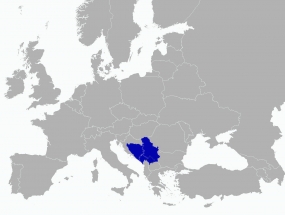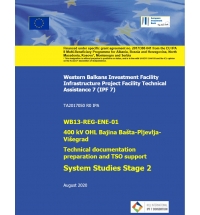400kV OHL Bajina Basta - Pljevlja - Visegrad Technical Documentation Preparation and TSO Support
Client: Hill International N.V. (The Netherlands), KfW Bank
Type: Project
Finishing date: November 2020 (April 2022)
Team: Slobodan Markovic - Team Leader, B. Sijakovic, I. Mihajlovic-Vlaisavljevic, D. Todorovic, O. Vukovic, B. Brdjanin
The objective of this feasibility study and environmental impact assessment is to justify the development of a 400kV connection between Serbia, BiH and Montenegro, as well as a 400kV connection between Obrenovac (RS) and Bajina Basta (RS). The study takes into account local rules for the transmission system management (network and other rules), as well as:
- ENTSO-E operating guidelines and
- ENTSO-E document "Guidelines for cost-benefit analysis of transmission network development projects".
Accordingly, the further development of the regional electricity market in the region of Bosnia and Herzegovina, Serbia and Montenegro, implies the need to further strengthen of the internal and interconnected links of these countries.
The development of a Feasibility Study and the entire project results in following:
- A structural approach to justify the construction and development of 400kV transmission lines and the improvement of regional interconnections, in order to facilitate electricity transfers in the region.
- Increase of Net Transmission Capacity in order to facilitate the exchange of the electricity for the purposes of consumption and transit growth, connection of the new conventional and renewable energy sources, as well as increase of transmission capacity in Serbia, Montenegro, BiH and the region of South-east Europe in general.
- Improving the stability and reliability of the regional network, which would lead to an improvement in overall security of supply.
- Reduction of technical losses in the transmission system.
- Potential for the development of a regional energy market in South-east Europe, and the creation of opportunities for electricity trade between South-east European countries.
- Reducing the cost of providing ancillary and system services, and improving the capacity for mutual exchange of emergency and balance energy.
- Assessment of the possibility of financing the project from the own sources of the transmission system operators of Serbia, Bosnia and Herzegovina and Montenegro
According to the scope of work, the following analyzes was done:
- Definition of the production capacity development scenarios
- Methodologies for network and market analysis
- Data collection and model formation
- System studies
- Electricity market simulations
- Evaluation of analysis results for each scenario processed
- Economic and financial analysis
- Preparation of the Project Implementation Plan
- Preparation of the Final Report
Type of services provided:
- Market evaluation of the proposed system interconnection scenarios through simulation of the electricity market merger
- Load- flows and voltage profile assessments for steady state analyses
- Load- flows and voltage profile assessments for security analyses
- Calculation of NTC values
- Losses calculation
- Techno-economic assessments (ENTSO-E CBA)
- Economic and financial assessments


